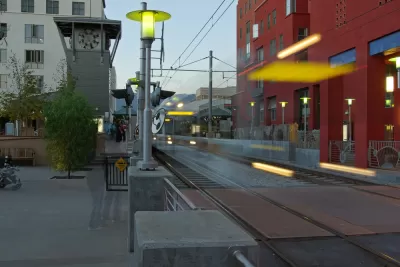As ridership revenues drop, more agencies are looking to diversify their income sources by leasing agency-owned land to developers.

With ridership "plummeting" during the pandemic, cash-strapped transit agencies are turning to leasing real estate to recover lost revenue, reports Jenni Bergal. "Many large transit agencies already have their own real estate departments and for years have been leasing property—often parking lots near rail stations—to development companies," with rent subsidizing operations and maintenance. Encouraging transit-oriented development near stations is "seen as a way not only to create a long-term revenue stream, but also to increase ridership, minimize traffic congestion and help communities by providing jobs and housing, some of it affordable, near transit."
"Agencies have been experimenting with scrapping or reducing fares or adding service to bring back riders and ensure access for disadvantaged communities. During the pandemic, the majority of people who continued to ride buses and trains were essential workers with low incomes, often people of color." The shift toward cheaper or free fares, along with the precipitous fall in ridership caused by the pandemic, has "prompted many transit agencies to look at various ways to diversify their funding beyond relying on fareboxes and federal, state and local dollars."
"[S]ome transit agencies that have gotten into the real estate business are trying to develop affordable housing projects. They often lease to private developers, but sometimes they work with nonprofits, community groups or local governments." Jessie O'Malley Solis, an agency program manager for the Santa Clara Valley Transportation Authority, says "transit-oriented development offers the agency the opportunity to fund normal operations as well as service improvements and enhancements" that will prove solid investments in the system's future.
FULL STORY: Transit Agencies Lease Real Estate to Generate Much-Needed Cash

Planetizen Federal Action Tracker
A weekly monitor of how Trump’s orders and actions are impacting planners and planning in America.

Congressman Proposes Bill to Rename DC Metro “Trump Train”
The Make Autorail Great Again Act would withhold federal funding to the system until the Washington Metropolitan Area Transit Authority (WMATA), rebrands as the Washington Metropolitan Authority for Greater Access (WMAGA).

The Simple Legislative Tool Transforming Vacant Downtowns
In California, Michigan and Georgia, an easy win is bringing dollars — and delight — back to city centers.

The States Losing Rural Delivery Rooms at an Alarming Pace
In some states, as few as 9% of rural hospitals still deliver babies. As a result, rising pre-term births, no adequate pre-term care and "harrowing" close calls are a growing reality.

The Small South Asian Republic Going all in on EVs
Thanks to one simple policy change less than five years ago, 65% of new cars in this Himalayan country are now electric.

DC Backpedals on Bike Lane Protection, Swaps Barriers for Paint
Citing aesthetic concerns, the city is removing the concrete barriers and flexposts that once separated Arizona Avenue cyclists from motor vehicles.
Urban Design for Planners 1: Software Tools
This six-course series explores essential urban design concepts using open source software and equips planners with the tools they need to participate fully in the urban design process.
Planning for Universal Design
Learn the tools for implementing Universal Design in planning regulations.
Smith Gee Studio
City of Charlotte
City of Camden Redevelopment Agency
City of Astoria
Transportation Research & Education Center (TREC) at Portland State University
US High Speed Rail Association
City of Camden Redevelopment Agency
Municipality of Princeton (NJ)





























